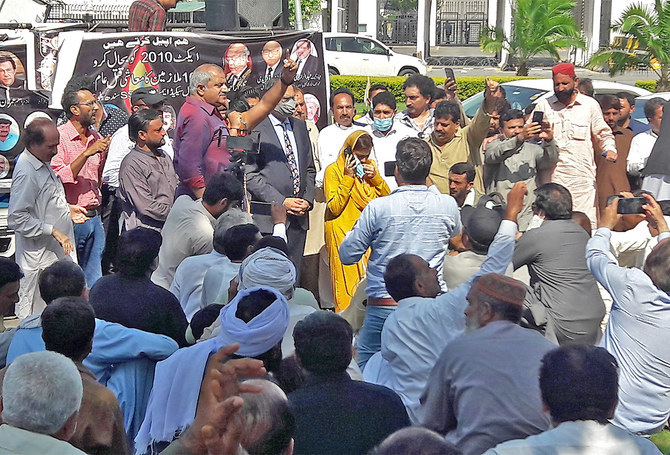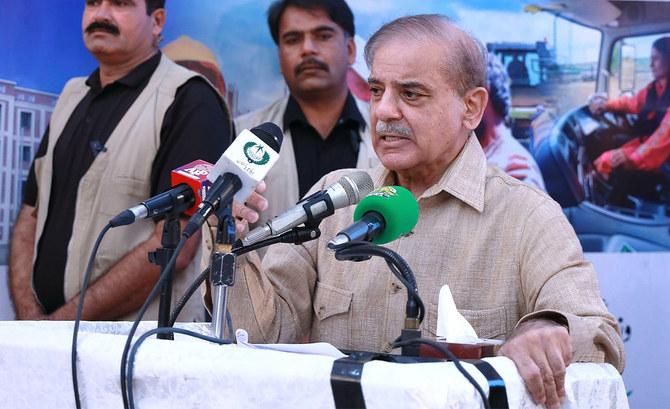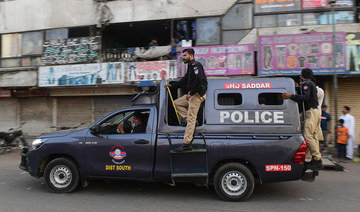ISLAMABAD: Hundreds of journalists camped outside Pakistan’s parliament on Monday protested a proposed media law that seeks to create a new regulator and set up special tribunals to try media-related cases, but a minister in Prime Minister Imran Khan's cabinet backed the idea, asking how were "journalist protection and hefty fines on fake news against the law."
The protesters, including journalists from all major Pakistani news channels and national and regional newspapers as well as from media outlets in all provinces, converged in front of parliament on Sunday under the banner of a federal body for the rights of journalists, the Pakistan Federal Union of Journalists (PFUJ). They have been criticizing the Pakistan Tehreek-e-Insaf (PTI) government for its policies on the media.
The protest comes ahead of President Dr Arif Alvi’s scheduled address with the joint sitting of parliament on Monday evening that marks the start of the fourth parliamentary year in Pakistan. The protesting journalists have been pressing the government to withdraw the proposal as this would further suppress the already shrunk freedoms of expression and press in the country.
“We are here to tell the government that working journalists won’t let it pass the black laws that could curb press freedom,” Afzal Butt, a former PFUJ president who is spearheading the protest, told Arab News.

Vehicles of the Pakistan army pass by journalists holding a protest against a new proposed media law outside parliament in Islamabad, Pakistan on September 13, 2021. (AN Photo)
The government announced in June it was planning to dissolve existing media regulators and censor boards and form a singular Pakistan Media Development Authority (PMDA) to oversee films, electronic, print and digital media, including web TVs, over-the-top content platforms and news websites.
The proposal has rattled journalists and rights advocates, who fear it would be used to stifle dissent and institutionalize censorship, but the government says the law is aimed at checking misinformation.
Pakistan's Information Minister Chaudhry Fawad Hussain said in a Twitter post that a few media owners were terming "fake news their 'right'" and asking their employees to take to the streets against the proposed authority.
“How is protection of an ordinary media worker and hefty fines on fake news against the journalism law,” the minister asked. “How can fake news be the basic right [of a journalist or a news outlet].”
Pakistan currently ranks 145 on the World Press Freedom Index, an annual listing of countries published by a media watchdog, Reporters Without Borders.
“We will not have any negotiations with any government representative and will disperse peacefully after the president’s address,” Butt said. “The press freedom is under attack during this government. Everybody knows they have been behind the lay-off of many senior journalists for criticizing their policies.”
All working journalists had out-rightly rejected this PMDA that was basically a "tool to control the traditional and digital media," he said.
According to a copy of the draft law seen by Arab News, it aims to create an “independent, efficient, effective, and transparent” institution to regulate all forms of media and bring them under a single and converged regulator and statutory authority.
The draft law proposes three-year imprisonment and a fine of up to twenty-five million rupees (roughly $1.5 million) for any licensee and registered authority that violates its provisions. The authority can act against any individual or media outlet under its jurisdiction without issuing a show-cause notice and affording them an opportunity for a hearing, according to the draft. The proposed authority or its chairman may also order in writing to seize the equipment of a media organization or seal the premises of the licensee.
Any person aggrieved by a decision or order of the authority can file an appeal within 30 days, which will be decided by media tribunals within 45 days. Under the proposed law, only the Supreme Court of Pakistan can hear appeals against tribunal verdicts.
The licensees will also be bound not to broadcast, distribute or put anything online which may be deemed as defamatory or ridicule the head of state, officials of the armed forces or members of the legislative and judicial organs of the state.
Members of opposition parties, including the Pakistan Muslim League-Nawaz (PML-N) and the Pakistan Peoples Party (PPP), also visited the demonstration to express solidarity with journalists.
Calling the legislation a "black law" and an "attack on democracy," PPP Chairman Bilawal Bhutto-Zardari told the protesting journalists his party stood by them.
"The PPP will raise this issue not only in parliament, but also express solidarity with them at every protest sit-in," he said. "We'll move the court against it, if this bill became a law."
Speaking to the protesters, PML-N leader Ahsan Iqbal assured that his party would oppose the PMDA bill at every level, including in parliament, and it would not let the government pass the bill.
“We stand by the working journalists and will continue to play our part for freedom of press and freedom of expression in Pakistan,” Iqbal said.
The government has also apparently garnered support for the PMDA from a group of journalists, who identified themselves as PFUJ (Professionals), led by Mazhar Iqbal.
“We are supporting the PMDA because the government is assuring us to protect rights of working journalists through it, like job security and timely disbursement of salaries,” Iqbal told Arab News.
He was leading a group of over two dozen journalists in front of parliament, who were sloganeering in favor of the authority.



















